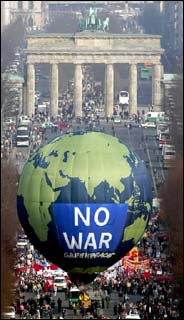CROSSROADS COMMENT -- Three Years and Counting

[gary daily col. 53 submitted but never published February 9, 2003]
“I hate war: it ruins conversation.” - Bernard de Fontenelle
This hadn’t happened to me in many years.
Growing up in Chicago and posing as a surly teenager, I would hang out on the corner of 63d and Kedzie with my “gang.” It was not uncommon for a car filled with equally disenchanted youths to roar by and yell something in our direction. I don’t remember hearing, “Have a nice day.” from them. We usually extended the conversation by flashing a series of arm, hand and finger signs in the direction of the fast departing vehicle. And with that the dialogue came to an end.
A similar “conversation” took place in the early 1960s while I was walking along, almost minding my own business, in front of Halverson’s Real Estate Office on the south side of Chicago. I was with a group of people who were carrying signs stating hopeful truths such as: “Equality Means Equal Housing” and “No Blockbusting In Chicago Lawn.” A few very agitated people standing nearby aimed a few untoward remarks in our direction. My response, as vocabulary challenged as theirs, was stifled by the leader of our modest “march.” I think she said something to me like, “Don’t ever talk to people like that.” She was right, but I really wasn’t trying to talk to them.
Flash forward a few years to the streets of New Brunswick, New Jersey. I remember almost equal numbers of anti-war marchers and flag waving anti-demonstrators lining the route that day. We chanted the somewhat silly slogans of choice, ditties such as: “Hey, hey, LBJ / How many kids did you kill today.” The bystanders, lacking poetry in their souls, yelled back at us, “U. S. A. Love it or Leave It.”
As we marched, I glanced over at veterans standing in the now tight uniforms they had pulled out of the backs of closets for the occasion. (Mine had inexplicably shrunk to a size too small to wear that day.) These vets flashed arm, hand and finger signs at us. I gave back as good as I got. None of us thought about draping our arms over each other’s shoulders and singing, “All we are saying . . . .” That would come many years and many body bags later.
These distant chords of memory were touched about a week-and-half ago.
I was standing on the corner of 7th and Cherry at noon. A dozen or so like-minded souls stood next to me. It was a cold January day. My only purpose was to wave a hand painted sign announcing to the drivers passing by that “War IS Terrorism.” I was stamping my cold feet and hoping once again that maybe this sensible flash of good sense would cause someone to think about the direction the nation is heading. It seemed like the thing to do.
A few reporters came by to ask questions and TV cameras filled ten minutes of tape so that 15 seconds might find its way onto the tube that evening. We were about ready to declare victory, put away the signs and look for a hot cup of coffee. Then a car lurched up Cherry Street, slowed almost to a stop, and rolled down the window. A face livid with anger filled the window frame. What I heard from that face was, as in my Chicago experiences, not entirely clear. If pressed, I would quote the words coming from the purple face in this car window as: “Blah, blah, blah . . . VX gas . . . blah, blah YOU DUMB &%$# [expletive deleted]!”
I had the presence of mind not to revert back to my gang response of the past. My gloved fingers and my mouth remained silent. And a good thing, too. Among our little band of anti-war demonstrators were at least two nuns and a local minister of the gospel. Our group also included a Viet-Nam vet, a retired school teacher and a student or two--a sprinkling of the usual suspects when it comes to standing up against war, poverty, and injustice. Most of those assembled would not have appreciated a coarse and inarticulate response on my part.
It all made me think again how many people stand mute and uninformed when it comes to decisions being made about war. Understandably they want to trust their leaders to know more than they do. But some of these same people, for whatever reason, feel the need to curse and jeer at anyone who questions those leaders, challenges the decisions being made, refuse to be led in a direction they judge to be strategically flawed and morally bankrupt.
If you can’t handle challenges to authority on high, you should ignore my pointed reminiscing and criticisms and go directly to reading the following books.
For the strongest argument that can be made favoring the war (but not the rush to war), try Kenneth Pollack’s The Threatening Storm: The Case for Invading Iraq. Match this with John R. MacArthur’s Second Front: Censorship and Propaganda in the Gulf War so that you will have a more critical perspective on what you hear and read about the war should it take place.
And finally, read Thucydides’ The PeloponnesianWars, especially the short section known as “The Melian Dialogue.” That’s the part about democratic Athens embracing a policy of “might makes right,” a policy the Athenians followed to their eventual destruction.
If you read and think about any of this, there will be no reason to give a second thought to anyone who might come by and call you a “Dumb &%$#.”


0 Comments:
Post a Comment
<< Home